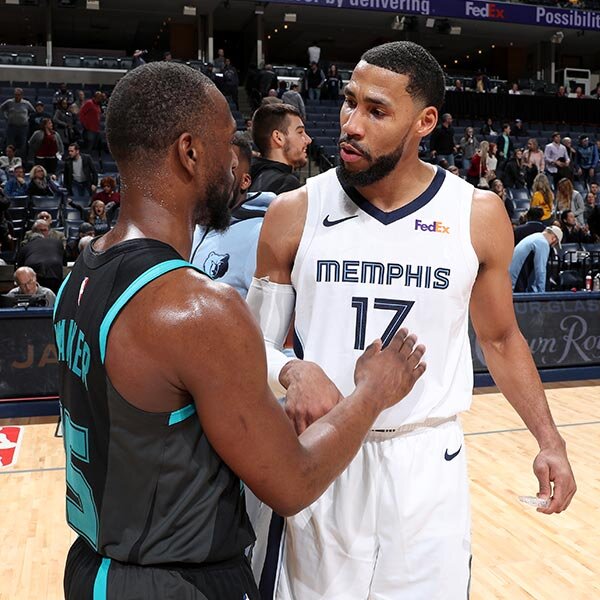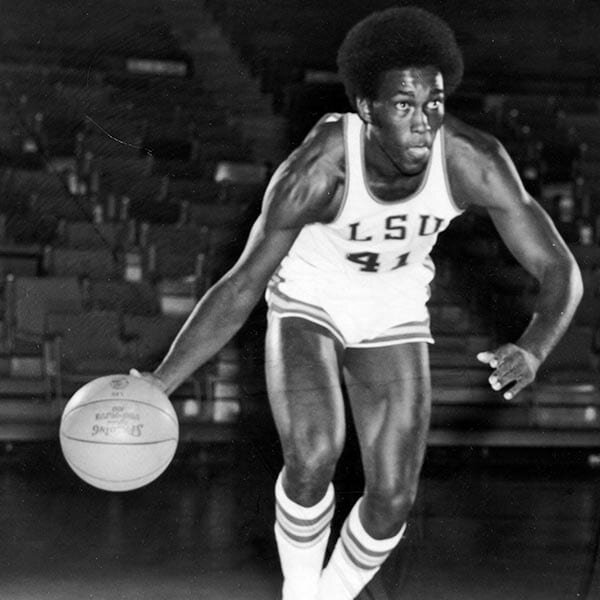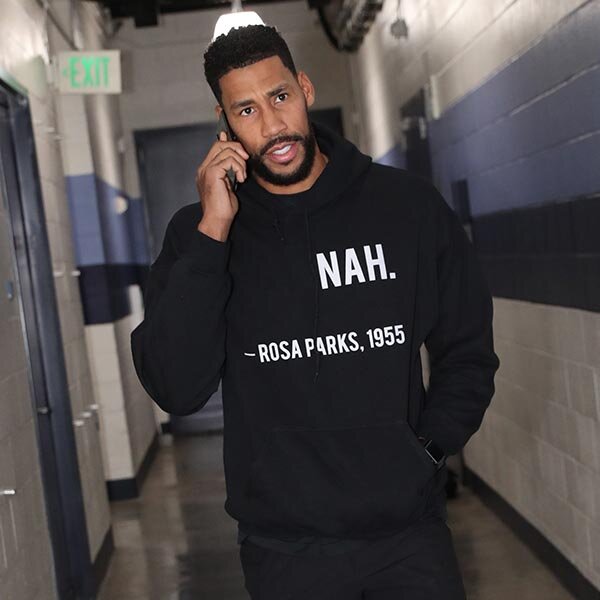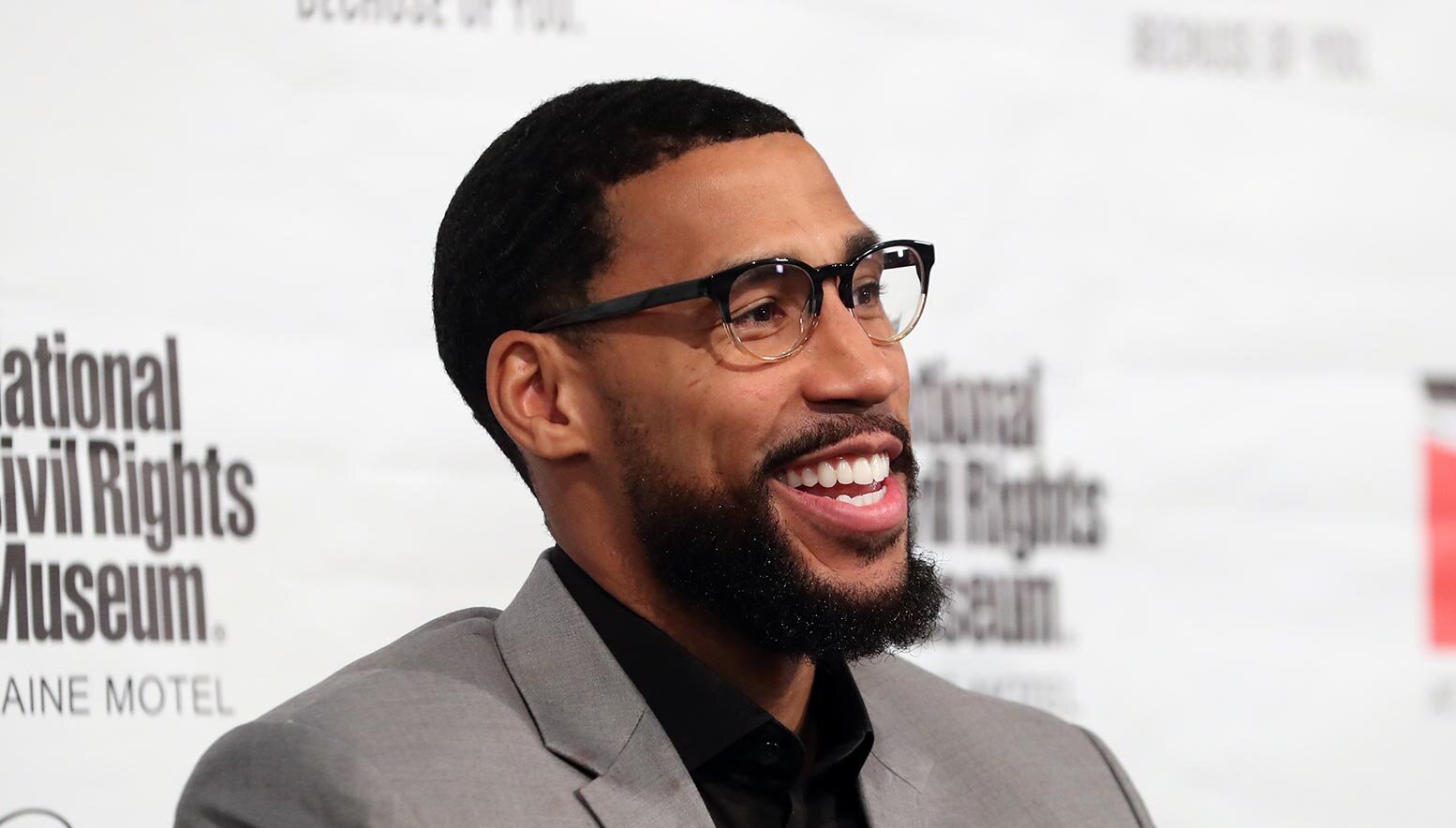CHARLOTTE – Veteran Grizzlies guard Garrett Temple projects much taller than 6-foot-6, especially when boosted by the historic shoulders on which he’s stood to reach this point in his journey to leadership.
As the league All-Star Game returns to Charlotte later this month, Temple is a little more than halfway through his three-year term as a vice president of the NBA Players Association. And All-Star Weekend is always a reminder of how much the league, overall, and its players in particular have thrived.
There’s also plenty of work to be done to keep the game’s current and former players moving forward. That’s among the reasons Temple looks forward to his time off the court when he helps to institute programs for players who range from league superstars to end-of-the-bench reserves as they prepare for life after the game.
But when Temple looks to the past, he sees the extraordinary foundation his father and grandfather established as contributors to the civil rights movement in their native Baton Rouge, La. – and beyond.

Kemba Walker #15 of the Charlotte Hornets and Garrett Temple #17 of the Memphis Grizzlies talk after the game on January 23, 2019 at FedExForum in Memphis, TN. Photo by Joe Murphy via Getty Images.
“The things they had to withstand to accomplish everything they did – that’s an example to me every day,” Temple said as February’s Black History Month opens with the Grizzlies in Charlotte on Friday to face the Hornets. “My grandfather taught my dad how to be a leader and my dad taught my older brothers and me to be independent thinkers. That’s what I learned early on in the face of peer pressure. I’m not going to fall into trends. If you’re not a follower, you’re a leader.”
Leadership and communication skills are as much a part of Temple’s arsenal as the defense and shooting touch he hopes to rekindle when he returns from nagging injuries that have sidelined him recently. Temple will likely miss Friday’s game as he continues to rehab from a shoulder sprain, but has increased his conditioning and activity the past few practice sessions, which included Friday morning’s team shootaround.
My grandfather taught my dad how to be a leader and my dad taught my older brothers and me to be independent thinkers. That’s what I learned early on in the face of peer pressure. I’m not going to fall into trends. If you’re not a follower, you’re a leader.
Garrett Temple
The value of Temple’s role has always extended beyond the basketball court. And paving the way for African-American progress in his native Louisiana has long been the family business.
Three generations ago, Collis Temple Sr. completed his undergraduate degree from Southern University in Baton Rouge and hoped to stay in town to pursue his Masters at Louisiana State University. Despite an impeccable academic record, he was denied entry amid 1950s Jim Crow segregation practices.

Collis Temple Jr. was the first African-American basketball player at LSU in 1971. Photo by LSU Sports Information.
“The state’s biggest university wasn’t willing to take him, but the state was willing to pay his tuition to anywhere else,” Garrett Temple said. “So my grandfather ended up getting his Masters from Michigan State. This is the same man they came to when they wanted his son to be the first black player at LSU.”
Seven years after the 1964 Civil Rights Act was passed by Congress, the governor of Louisiana was among those who recruited Collis Temple Jr. to become the first African-American basketball player at LSU. It was Collis Sr.’s forgiveness and grace that opened the door for not just his son and grandsons to be scholarship athletes at LSU, but also broke barriers for generations to come.
Collis Temple Jr. enrolled at LSU three years after Martin Luther King, Jr. was assassinated in Memphis.
“We were in quite a bit of a turbulent time,” Collis Temple Jr. told NBA.com last year. “Particularly in the south, so it was quite a challenge. It was interesting, and at the same time, a really challenging time.”
Nearly 45 years later, Garrett Temple was elected by his NBA peers to work alongside LeBron James, Stephen Curry, Chris Paul and others to steer players through another dose of social justice challenges. The NBPA has addressed issues ranging from recent police brutality and discrimination to establishing programs and resources to assist disadvantaged youth in NBA cities.

Garrett Temple #17 of the Memphis Grizzlies arrives prior to a game against the Utah Jazz on November 12, 2018 at FedExForum in Memphis, Tennessee. Photo by Joe Murphy via Getty Images.
Last month, during the Grizzlies and NBA annual Martin Luther King, Jr. Celebration Game events, Temple was at the Lorraine Motel site of King’s assassination as part of a panel discussion on the intersection of race, sports and society at the National Civil Rights Museum. Later this month, Temple will be among the NBAPA’s executive committee attending All-Star Weekend for meetings on league developments.
“My role is to inform my teammates and inform the rest of the league what’s going on,” Temple said of his responsibilities. “We have conference calls about once a month, and we talk about key issues to address in the winter and summer league meetings. I take a lot of pride in that.”
Temple’s leadership on and off the court is what attracted the Grizzlies, who traded to acquire him last summer from Sacramento in the final year of a contract that expires after this season. Grizzlies coach J.B. Bickerstaff said the team is getting everything – and more – that was expected from Temple, who got off to the most productive start of his career before struggling with injuries in recent weeks.
Yet it’s been Temple’s ability to shoot straight with his teammates as a veteran voice in the locker room that has resonated in Memphis.
“He’s consistent, just as a human being,” Bickerstaff said. “He’s not up and down like the NBA season goes. Every day, he’s the exact same person. So in good times and bad times, you know you can count on him. He’s going to give you the honest answer. The other thing is just how unselfish he really is. He doesn’t do anything except for what’s best for the team’s interest. His story as a guy who doesn’t give in, who’s been cut, been through the NBA ringer and yet has found a way to persevere – those are all qualities people can look up to and people can trust.”
Take basketball away from Temple, and he’d still likely be a national leader on the corporate, economic, social or political scene. Adding basketball to the equation only makes Temple’s role and responsibilities more essential in today’s NBA as he helps players plot their course for tomorrow’s life beyond the court.
He’s not up and down like the NBA season goes. Every day, he’s the exact same person. So in good times and bad times, you know you can count on him.
J.B. Bickerstaff
Temple points to NBPA programs that offer current players offseason training and opportunities to explore front-office management roles, coaching and broadcasting.
“A lot of guys around the league call me asking how to get in touch with people so they can get into those programs,” Temple said. “One thing overlooked and not widely understood is the type of programs we offer while they’re playing and as they’re retiring, so they can make successful transitions.”
Garrett has been raised on the Temple family legacy of service and sacrifice.
Like grandfather, like father, like son.
The contents of this page have not been reviewed or endorsed by the Memphis Grizzlies. All opinions expressed by Michael Wallace are solely his own and do not reflect the opinions of the Memphis Grizzlies or its Basketball Operations staff, owners, parent companies, partners or sponsors. His sources are not known to the Memphis Grizzlies and he has no special access to information beyond the access and privileges that go along with being an NBA accredited member of the media.
